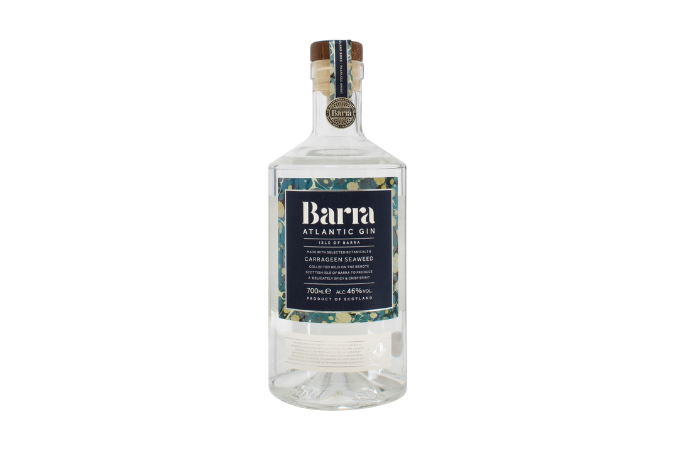Fresh, saline, clean – the feeling of the brisk sea air, big skies, and wide horizons on the coast is so compelling that increasingly, people are trying to bottle it. Turning to the botanicals growing on their doorstep, coastal distilleries across the British Isles are using their distinctive seascapes to stand out in an ever-growing market.
Arguably, it was Isle of Harris Gin, launched in 2015, that kicked off this beachy gin trend, flagging the inclusion of sea kelp as key to its flavour – the drink went on to win a Silver medal at the IWSC 2021. But our appetite for seaside gins goes beyond novelty or the one-off. Both Edinburgh Gin and the makers of Rock Rose, Dunnet Bay Distillers, found so much demand for limited-edition coastal gin that they’ve added them to their core ranges.

‘We’ve noticed a change in customer palates,’ says Russell Evans, owner of Norwich-based Bullards Gin. ‘More savoury, herbaceous gins are becoming popular and coastal gins – like ours, which captures the North Norfolk coast in its profile – fit this perfectly.’
Often characterised by botanicals like samphire, sea purslane, and sea aster, these spirits are interesting by virtue of the fact that they are by no means homogenous – Llanfairpwll Distillery on Anglesey, for example, uses oysters from the Menai Straits to give a creaminess to its gin, and many others are playing with the 640 different kinds of seaweed to be found on our shorelines.


Seaweed is a natural, abundant, and sustainable cornucopia for botanical experimentation, each one having its own flavour profile, as Moira Doherty, gin distiller and director at Sliabh Liag Distillers in Ireland’s County Donegal explains: ‘Carrageen moss has a sweet nutty quality. Channel wrack smells like a wet dog but when distilled is more like bergamot. And pepper dulse is the most intense of all – it makes your lips tingle and tastes of garlic salami when it’s eaten straight from the ocean.’

In cocktails, too, bartenders are making the most of the potential in coastal botanicals. You only need look at the menus of two of London’s most recent openings to see. At Sweeties in The Standard Hotel, Crystal Healing – a bright blue spirulina and Scotch cocktail – features a pepper dulse seaweed distillate that’s ‘salty, slightly smoky with hints of iodine and buckets of umami,’ according to head bartender Jack Sotti. Likewise, at Silverleaf at the Pan Pacific London the Heartleaf/Kombu, a Martini-based cocktail, features a kombu distillate that tastes like the air on a blustery clifftop walk.
And perhaps this is the appeal – for the landlocked, one sip can transport you to an empty windswept beach, that wide expansive coastal feeling served in a glass.
9 coastal gins featuring botanicals from Britain and Ireland’s shores

Lussa Gin
Made on Jura in the Inner Hebrides, Lussa Gin uses sea lettuce, which is abundant in the bays on the the north end of the island. The team settled on the botanical after experimenting with different kinds of seaweed, believing it gives the spirit just the right amount of sea aroma.
£40, lussagin.com

Seaside by Edinburgh Gin
Invented as the result of a collaboration with the team at the International Centre for Brewing and Distilling at Herriot Watt University, Edinburgh Gin’s Seaside Edition was immediately popular and went on to win a Silver medal at the IWSC 2021. Featuring bladderwrack, which is high in residual sugar, the gin carries a slight sweetness.
£32.50, edinburghgin.com

An Dúlamán Irish Maritime Gin
Made in Donegal, An Dúlamán features five different seaweeds – sweet kombu, dulse, pepper dulse, dúlamán and carrageen moss – combining to make a savoury gin, and Ireland’s first maritime variety.
£29.25, masterofmalt.com

Barra Atlantic Gin
Made in the Outer Hebrides at the Isle of Barra distillery, this gin features carageen as its main botanical, which works in partnership with spice notes and citrus tones to give the spirit a bold and clean flavour.
£37, isleofbarradistillers.com

Atlantic Spirit #6 Laver Gin
North Devon distillery Atlantic Spirit make small batch gin using botanicals local to Abbotsham, where the husband-and-wife team are based. This edition uses laver, a seaweed particular to the Devon and Welsh coasts.
£38, atlantic-spirit.co.uk

Shetland Reel Ocean Sent Gin
Stuart and Wilma Nickerson from Shetland Reel distillery on Unst, one of Britain’s most northerly islands, worked with the University of the Highlands and Islands to uncover the most sustainable seaweed to use, and then created the recipe for this slightly salty, savoury gin using the bladderwrack abundant on the island.
£36, shetlandreel.com

Dà Mhìle’s Organic Seaweed Gin
A variation on Welsh distillery Dà Mhìle’s classic, the Ceredigion small-batch gin makers add organic seaweed to their spirit to infuse, giving a savoury edge to their garden herb-led original.
£36, damhile.co.uk

Rock Rose Citrus Coastal Gin
Dunnet Bay Distillers have always made much of the local botanicals in their gins, and this expression is no exception, using kelp foraged from the nearby Caithness coastline, and liquorice salt to enhance the savoury notes.
£37.50, dunnetbaydistillers.co.uk

Isle of Harris Gin
No limited edition here – the first legal distillery on the Hebridean island launched with its sugar kelp-infused gin, and has never looked back, setting a marker in the sand for other coastal gins.
£40, harrisdistillery.co.uk







